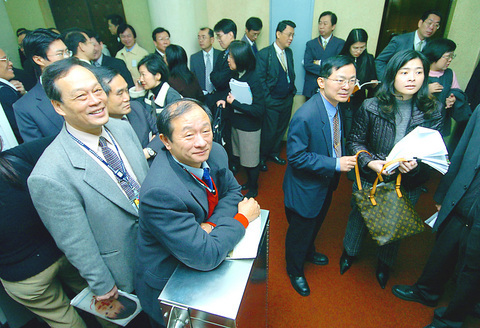The statute governing the arms deal with the US and its related budget plan failed to pass the Procedure Committee again yesterday, while the Democratic Progressive Party's (DPP) proposed resolution asserting the sovereignty of the Republic of China (ROC) was also rejected in the committee session.
Meanwhile, the request for the legislature to review Control Yuan member nominations was also rejected by the pan-blue camp again.

PHOTO: CHIEN RONG-FENG, TAIPEI TIMES
The DPP has attempted to get the statute, the budget plan and the request passed several times, while the sovereignty bill was brought up for discussion in the committee for the first time yesterday.
The DPP first proposed the resolution in an attempt to counter China's anti-secession bill.
The resolution states that the "ROC" is a sovereign and independent country neither governed by nor belonging to China. It also says that the cross-strait "status quo" cannot be changed unless the Taiwanese public consents to the change via referendum.
But the People First Party insisted that the DPP add a part about opposition to Taiwan's independence, or it would not approve of the resolution, and the pan-blue camp again rejected the resolution.
"The sovereignty of the ROC is already something that is acknowledged by the Taiwanese public, and proposing this resolution is like taking one's pants down before farting," Chinese Nationalist Party (KMT) caucus whip Huang Teh-fu (黃德福) said. The Chinese proverb "to take one's pants down before farting" means to engage in an unnecessary act.
Huang said that the most important thing that could be done to defend the ROC's sovereignty was for the pan-green camp to not pursue any activities related to independence.
To defend the resolution, DPP Legislator Lee Wen-chung (
"Since the resolution needs to be approved by the legislature, we can always amend the resolution content," Lee said.
In related news, a partial amendment to the Criminal Code got its second reading in the sitting yesterday, and the amendment stipulates that the death sentence will be abolished gradually.
The amendment further stipulates that a prisoner sentenced to life can request parole only after having served 25 years, up from the current 15 years.
The maximum allowable sentence -- aside from a life sentence or a death sentence -- for a single offense remains 20 years, but a criminal accused of committing several offenses at the same time can receive a 30-year sentence, up from the current 20 years.
The most important change is the tightening of the parole threshold, and the imposing of severer sentences on prisoners committing several offenses at the same time. This is part of the government's policy of gradually abolishing the death sentence.
The amendment is slated to get a third reading -- to be officially approved by the legislature -- in the next sitting on Friday.

An essay competition jointly organized by a local writing society and a publisher affiliated with the Chinese Communist Party (CCP) might have contravened the Act Governing Relations Between the People of the Taiwan Area and the Mainland Area (臺灣地區與大陸地區人民關係條例), the Mainland Affairs Council (MAC) said on Thursday. “In this case, the partner organization is clearly an agency under the CCP’s Fujian Provincial Committee,” MAC Deputy Minister and spokesperson Liang Wen-chieh (梁文傑) said at a news briefing in Taipei. “It also involves bringing Taiwanese students to China with all-expenses-paid arrangements to attend award ceremonies and camps,” Liang said. Those two “characteristics” are typically sufficient

A magnitude 5.9 earthquake that struck about 33km off the coast of Hualien City was the "main shock" in a series of quakes in the area, with aftershocks expected over the next three days, the Central Weather Administration (CWA) said yesterday. Prior to the magnitude 5.9 quake shaking most of Taiwan at 6:53pm yesterday, six other earthquakes stronger than a magnitude of 4, starting with a magnitude 5.5 quake at 6:09pm, occurred in the area. CWA Seismological Center Director Wu Chien-fu (吳健富) confirmed that the quakes were all part of the same series and that the magnitude 5.5 temblor was

The brilliant blue waters, thick foliage and bucolic atmosphere on this seemingly idyllic archipelago deep in the Pacific Ocean belie the key role it now plays in a titanic geopolitical struggle. Palau is again on the front line as China, and the US and its allies prepare their forces in an intensifying contest for control over the Asia-Pacific region. The democratic nation of just 17,000 people hosts US-controlled airstrips and soon-to-be-completed radar installations that the US military describes as “critical” to monitoring vast swathes of water and airspace. It is also a key piece of the second island chain, a string of

The Central Weather Administration has issued a heat alert for southeastern Taiwan, warning of temperatures as high as 36°C today, while alerting some coastal areas of strong winds later in the day. Kaohsiung’s Neimen District (內門) and Pingtung County’s Neipu Township (內埔) are under an orange heat alert, which warns of temperatures as high as 36°C for three consecutive days, the CWA said, citing southwest winds. The heat would also extend to Tainan’s Nansi (楠西) and Yujing (玉井) districts, as well as Pingtung’s Gaoshu (高樹), Yanpu (鹽埔) and Majia (瑪家) townships, it said, forecasting highs of up to 36°C in those areas